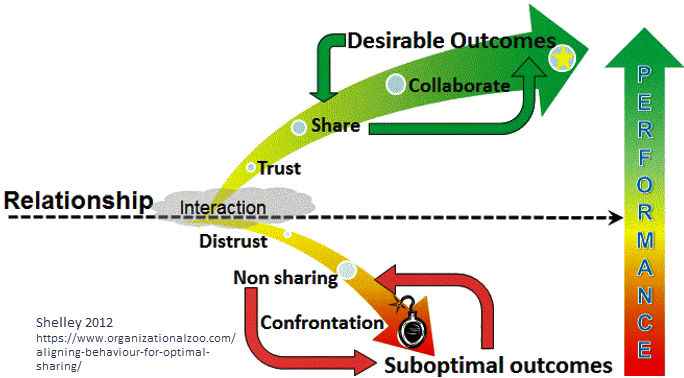
Principles for Sustained Collaboration
I was reflecting an article titled “Cracking the Code of Sustained Collaboration” in the November issue Harvard Business Review. The article listed 6 “tools” that I agree will support collaboration. However, I approach collaboration from a different direction. Collaboration is something that happens between PEOPLE. As such, the people and how they interact is the key to effective sustained collaboration more than tools. You cannot “make” or “train” people to collaborate, because collaboration is an outcome of a trusted ecosystem. Collaboration is optimised when leaders pay attention to the relationships in the environment. This is best achieved by BEING a role model for the behaviours they want others to emulate. Being clear around a set of Collaborative Principles also helps others to understand the fundamental aspects of which behaviours and actions stimulate collaborative outcomes.
So, to collaboratively add to the article, I took the six tools from the HBR article and modified them into a set of principles that will stimulate collaboration (when applied to the way the people in the ecosystem interact). These principles recognise that it is not possible to force people to do things you want on an ongoing basis. It is only possible to engage people to willingly share what they have to offer, through inclusive facilitation of their interactions.
A Set of Principles for Sustained Collaboration:
1. Engage people in inclusive “Conversations That Matter” by balancing listening and constructive contributions (after reflecting on others’ perspectives)
2. Be a role model, demonstrating empathy and optimism and support others to do so
3. Provide a safe environment where a diversity of participants feel comfortable giving and receiving feedback
4. Balance leadership, management and followership and align these to the conversations in context around the shared purpose
5. Generate clarity by stating all ideas in the format of “Verb, Adjective, Noun, for the purpose of (tangible output) and (intangible) Outcomes”
6. Facilitate interactions that build trusted relationships to cocreate synergistic emergence of new insights, ideas and new knowledge
I am sure you too could collaborate in this way, so we cocreate some additional principles that would also help develop trusted environments and accelerate sustained collaboration. If only you had the time…
Specialist in product innovation , development, claims ,business value chain new business pilots for food & beverage, ingredients ,chemicals. TATA Chemicals , Consumers, Gen mills Mondelez -Kraft-Cadbury
4yGreat Arthur and very simple . Brings back old memories .
Founder & CEO, Civil & Structural Engineer, EdTech & Social Entrepreneur, Sustainable Futures
4yVery nice Arthur Shelley - I will collaborate with you shortly on some ideas and observations I have observed with the rolling out of our KnowledgeMentor and MentorExcellerator mobile Apps. There are some very interesting and emerging trends in generational collaboration preferences and what we think might work as opposed to what does seem to work. The real meaning, feeling and sentiment hidden in the "thick data" of human mobile collaboration and on-demand contextual learning is becoming an interesting new frontier in modern mobile Knowledge Management and Mentoring. Shelley Coleman - Marsh Deonie Botha
Humanitarian Field Team and WASH Specialist
4yHi Arthur, nice principles. Though I'd love an example for number 5, if possible. They seem to provide a useful overarching framework for the training techniques in the HBR article. From my perspective, and as articulated in your diagram at the top of this article, it boils down to the need for trust and working towards a common vision/objective. This is also the case in my context of international humanitarian response, where the best indicator of an effective team has been found to be trust. Oxfam has developed a guide to support teams and organisations to create trust in these complex and dynamic environments. Perhaps the Oxfam approach is a faster version of the HBR training techniques?
Category Leader RDQ Bakery at Mondelēz International
4yThanks Arthur. Simple and clear ! As the title depicts : Sustained Collaboration is so important and something earned.
Creating Real Magic: Architect of Transformation | Chief Facilitator at STEEP Renaissance | Sage, Visionary, Mentor
4yThmks for reframing this from an 'us' dimension Arthur. Very helpful